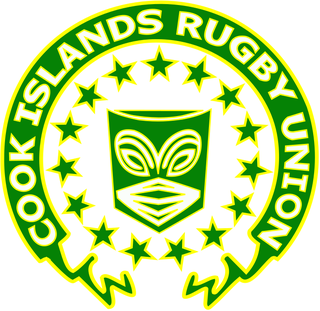The Pacific Tri-Nations was the traditional rugby union series between Tonga, Fiji and Samoa. It was established in 1982 with the Samoan team, then known as Western Samoa, winning the tournament. In 2006 it was replaced by the IRB Pacific 5 Nations which was then renamed the Pacific Nations Cup.

The Cook Islands national rugby league team have represented the Cook Islands in international rugby league football since 1986. Administered by the Cook Islands Rugby League Association (CIRLA), the team has competed at three Rugby League World Cups, in 2000, 2013 and 2021, and are coached by Kar-Michael Hunt.
In qualification for the 2007 Rugby World Cup, there were two places available for Oceania teams, and one place in the repechage. In the group rounds, there were three points awarded for a win, two for a draw, and one for a loss. There were no bonus points awarded.
The Tahiti national rugby union team is a third tier rugby union team, representing the island of Tahiti in French Polynesia, an overseas collectivity of France. They first played in 1971 and have played numerous games to date, most against rivals Cook Islands and several against Niue. Other games have been played against Samoa, Wallis and Futuna, Papua New Guinea and Tonga. France played a match against Tahiti at the end of their 1979 tour and won 92–12. Plans to have annual "test" match series against Pacific island neighbours, New Caledonia have been put on hold, due to time, availability, finances, and coaching and refereeing resources. They have yet to qualify for the Rugby World Cup. Rugby union in Tahiti is administered by the Fédération Tahitienne de Rugby de Polynésie Française. Currently, players who have represented or played for the Tahiti national rugby team, are eligible to represent France. However, playing at a professional level can only enable this. At present there are several Tahitian professional rugby players abroad in France's Top 14 and Pro D2 professional competition.

The Cook Islands is a third tier rugby union playing nation. They began playing international rugby in early 1971. Thus far, the Cook Islands have not made an appearance at any of the World Cups.
The Papua New Guinea national rugby union team, nicknamed the Pukpuks,, played its first international in 1966, defeating Vanuatu 47–3. Papua New Guinea have not so far qualified for a Rugby World Cup. They participated in the Oceania World Cup qualifying tournaments for the 2007, 2011 and 2015 World Cups, but did not qualify.
This article lists the results for the Fiji national football team from 2000 to present.

The Tonga women's national rugby union team are a national sporting side of Tonga, representing them at rugby union. They compete annually in the Oceania Rugby Women's Championship.

The Oceania Rugby Men's Championship is an international rugby union competition for countries and territories from Oceania with national teams in the developmental band. It is administered by Oceania Rugby.

The Oceania Rugby Women's Sevens Championship is the regional championship for women's international rugby sevens in Oceania. The tournament is held over two days, typically on a weekend. It is sanctioned and sponsored by Oceania Rugby, which is the rugby union governing body for the region.
The Federation of Oceania Rugby Unions (FORU) section of the 2015 Rugby World Cup qualification involved five teams competing for one spot in the final tournament in England.
The 2013 FORU Oceania Cup for national rugby union teams in the Oceania region was held in Papua New Guinea at the Lloyd Robson Oval in Port Moresby from 6 to 13 July.

The qualification process for the 2019 Rugby World Cup in Japan began during the pool stages of the 2015 tournament in England, during which the top three teams from each of the four pools were awarded automatic qualification for the 2019 event. A further eight teams qualified through regional, cross-regional tournaments and the repechage process.
Qualifying for the 2019 Rugby World Cup for Oceania Rugby began in June 2016, where across 2 years, 3 teams competed for two direct qualification spots from Oceania. Two places were available to Oceania in a cross-regional play-off series' to qualify for the World Cup and or advance through the Repechage.
The Papua New Guinea women's national rugby union team played their first international against Fiji in 2016. They compete annually in the Oceania Rugby Women's Championship, and have not qualified for the Rugby World Cup as yet.
The 2018 Oceania Sevens Championship was the eleventh Oceania Sevens in men's rugby sevens. It was held at ANZ Stadium in Suva, Fiji on 9–10 November. Host nation Fiji won the tournament, defeating New Zealand by 17–12 in the final.

The 2019 Oceania Cup was the inaugural edition of the Oceania Cup. Contested by six teams, the competition began in June and concluded in November.
The 2019 Oceania Sevens Championship was the twelfth Oceania Sevens tournament in men's rugby sevens. It served as the regional qualifier for the 2020 Tokyo Olympic Sevens and was held at ANZ Stadium in Suva, Fiji on 7–9 November. A competition for deaf teams was also included as part of the 2019 Oceania Sevens.

The qualification process for the 2021 Rugby World Cup began on 9 August 2019 with 12 teams qualifying to the tournament which will be held in New Zealand. The 2021 Rugby World Cup was postponed by one year in March 2021 to 2022 due to the COVID-19 pandemic.
The 2019 Oceania Rugby Women's Championship that was held in Fiji, was the 2021 Rugby World Cup qualifier for the Oceania region. The tournament was played at Churchill Park in Lautoka from 18–30 November 2019, with six teams entered. Australia and New Zealand sent development teams, having already qualified for the 2021 World Cup.







